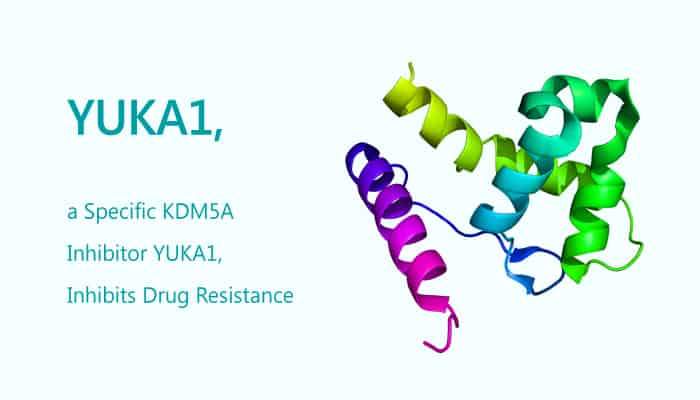KDM5A (Lysine-specific demethylase 5A) is a histone lysine demethylase, which binds with other proteins to retinoblastoma protein. The latter regulates cell proliferation. KDM5A exhibits high levels of some human cancers. It involves cancer processes, such as tumorigenesis, metastasis, and drug tolerance. Therefore, we need to found out more KDM5A Inhibitors for cancer therapy.
YUKA1 is a potent KDM5A inhibitor and is cell-permeable, which makes it easy to function in cells. Furthermore, YUKA1 inhibits the proliferation of cancer cells.

But, how does YUKA1 protect against cancer cells via KDM5A? Let’s discuss it in detail.
In the beginning, YUKA1 specifically targets KDM5A. It shows an IC50 value of 2.66 μM for KDM5A. The inhibitor shows no activity against KDM5B and is ~3 less active for KDM5C at 50 μM. Besides, it does not half-maximally suppress KDM6A or KDM6B at the same concentration.
Based on the inhibitory effect on KDM5A, let’s see how YUKA1 works on cancer cells. Researchers choose a common cancer cell line, HeLa cells to examine the activity. After 48 hour treatment, YUKA1 increases H3K4me2 and H3K4me1 levels, which affects the rate of the proliferation of HeLa cells.
Since YUKA1 displays excellent inhibitory activity against HeLa cells, researchers wonder, whether it is also effective in other cancer cells. As a result, YUKA1 increases H3K4me3 levels in ZR-75-1 breast cancer cells. In addition, it shows no effect on normal cells.
To our delight, YUKA1 prevents drug tolerance in gefitinib-treated EGFR-mutant lung cancer cells as well as trastuzumab-treated HER2+ breast cancer cells.
References:
1. Gale M, et al. Oncotarget. 2016 Jun 28;7(26):39931-39944.